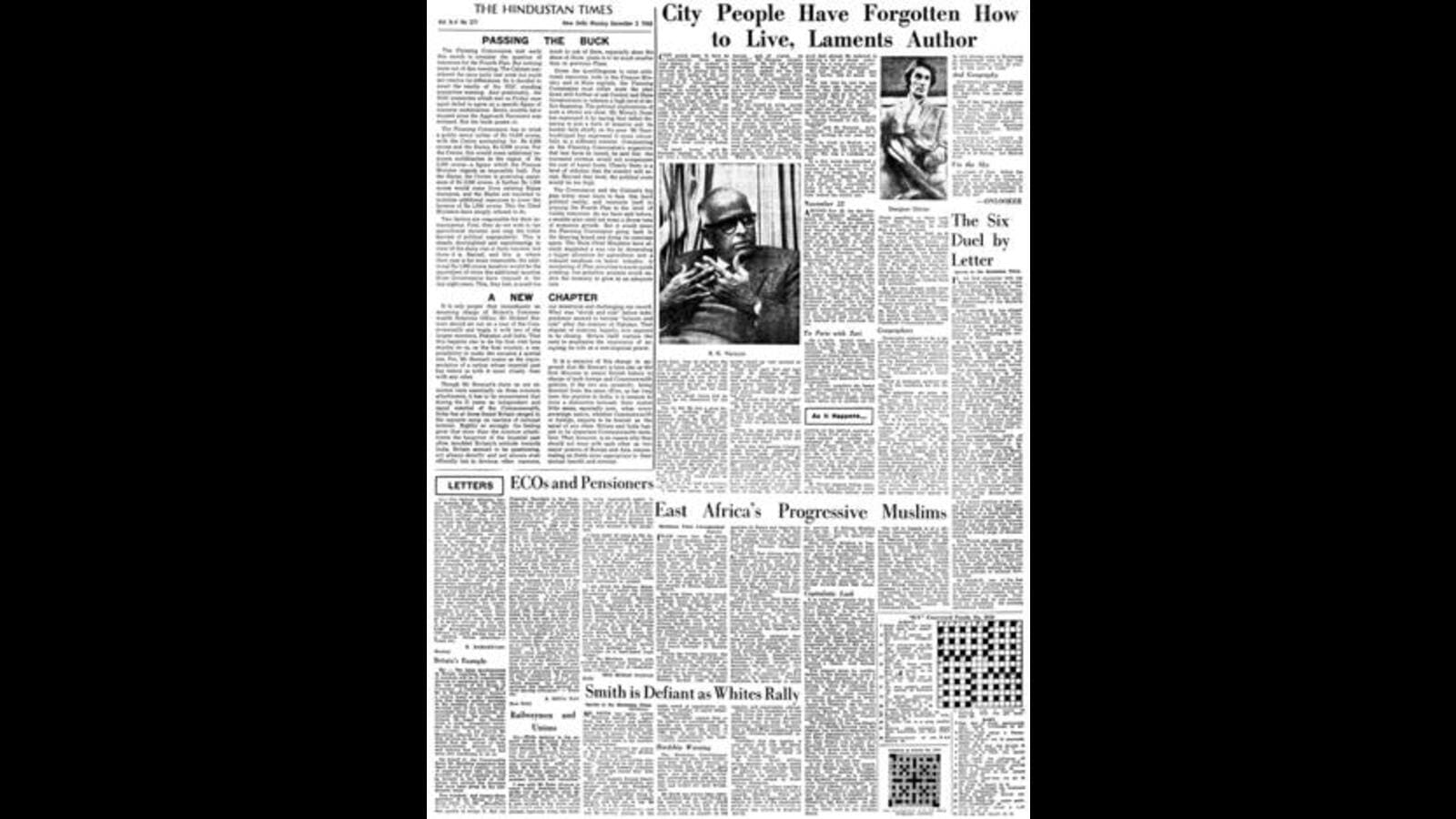City people seem to have no individuality. Their aspirations appear to be centered on just one thing, the business of survival and of getting on. They all look like going up the same elevator. This is the lament of novelist R. K. Narayan. Quietly dressed and inconspicuous looking, the novelist has an engaging smile which lights up his face. Once you hear him speak you do not forget him easily.
“Small towns are different,” he told Onlooker, gently stirring the sugar in his cup of tea. New Delhi he could tolerate because here you could smell the earth and see the trees. Calcutta- was half-way between a city and a town, it was a little of both. Madras was better. It was a collection of villages. Bombay he found the most urban of Indian cities.
“In small towns,” said Mr Narayan, sipping his tea as we sat atop a building not far from India Gate, “you do not meet the cocktail round and the rest of the stereotyped crowds. You can stop a man in a small town bazar and talk to him about his grandchildren, but not in a city where people do not have time to notice life. They are too busy rushing around.”
Was it in small towns that he picked up the characters for his novels?
Yes, he did. He was a great believer in walking. When you walked, you met people and observed things. He had his philosophy of walking. The loss of one’s legs today was responsible for many psychological ills. Somehow, ideas sorted themselves out while one walked. It was not that he did not use planes and cars. He did. He was in fact travelling most of the time, having permanently on a temporary basis, out of a meagre suitcase weighing according to the specification laid down by IAC. He had no wife – she died years ago-but he had a daughter who was married. That is why he could travel as much as he did.
Why was it he had no heroines but only heroes in his books? “I have no heroes, only non- heroes, and, of course, no heroines,” Mr Narayan correct. ed Onlooker. He did not perhaps understand women. But there were other reasons for the lack of heroines. Women were firm, they lived by set regulations and were altogether too clear headed -at least the women in his small town world. But men could fumble and be uncertain. Women he found were more stereotyped than men.
Did he intend to write novels other than the kind he had been writing, say, detective stories, travel books or biographies?
He was not interested in detective stories. You created a murder, decided who the murderer should be and then worked backwards. Biographies he neither read nor wished to write. Take even Gandihiji. He preferred to read his writings and letters. Travel books, yes, after a fashion – impressions, but not factual data.
Were the characters in his novels based on real persons or were fictional?
They were part fact and part fiction, Mr Narayan said. He made no distinction between fact and fiction. Often truth could seem quite fictitious and fiction could be a prototype for fact. You sometimes found life copying fiction.
What about titles for his books? Did they come first or last?
He had to be forced into finding titles for his books. They hardly ever seemed satisfactory to him. But titles had to be found. There was no getting away from them.
When he was not thinking up titles. characters and plots for his novels or writing them, how did he spend his time?
Music was his passion-Carnatic music because he understood it better than other styles and to an extent Hindustani music. He appreciated thumris and bhajans. He possessed as many as four tape-recorders and used them regularly to tape bits of music picked up here and there He did a lot of motoring all over South India. visiting small towns which provided the locale for his novels And, of course, he travelled a good deal abroad. He believed in meeting a lot of people everywhere for it was people who provided ideas for his characters.
We had heard he had met Greta Garbo. Did he know her well?
The last time he met her was three years ago. She was fairly cranky. She met nobody, usually wore large hats so as not to be recognized. “But if you want to see her I can tell you the particular bus stops she generally uses and other spots she visits..” Mr Narayan offered obligingly.
Had he ever found it difficult to express himself in the English language?
“No,” said Mr Narayan spontaneously. “I might have found it harder writing in my own language.”
Did he think in English or in Tamil? Again the answer was spontaneous. He did not think in words. His was a wordless concept.
In a few words he described a scene which was common to all regions in the country-a winding road, a small tea shop, a stray donkey standing not for away. It could be the approach to a small town anywhere in India. It did not need words to think it up. The picture was clear before the mind’s eye.


